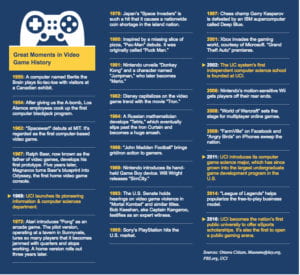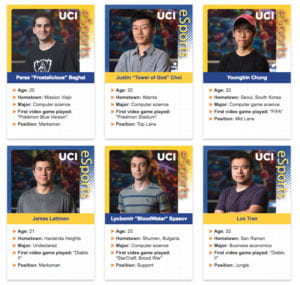A Bold New Sports Franchise
Seeing video games as the next frontier in college athletics, UCI launches player scholarships and a first-of-its-kind arena
The blind monk prowls the jungle, using sonar and karate kicks to stalk and pulverize his enemies. Nearby, his four teammates – endowed with magical powers and Rambo-grade weaponry – battle a platoon of exotic beasts, including a land shark that bursts out of the ground and swallows everything in its path.
These and other peculiar creatures run rampant in “League of Legends,” a wildly popular video game that some predict will overtake football as the superstar of college sports. Already, the game’s pro playoffs pack stadiums and draw online crowds that reportedly rival viewership for the World Series.
“This is not going to be just another sport.”
Reading these electronic tea leaves, UCI made headlines last fall by fielding the nation’s first school-sponsored eSports team at a public university. The campus wooed top players with scholarships and built a trailblazing computer arena, all financed by corporate donations.
“It’s a brilliant step,” says video game pioneer Nolan Bushnell, who co-founded Atari in 1972 and helped devise “Pong.” UCI’s program will make the university “more relevant” to students and spur other colleges to follow suit, he notes.
The Anteater team could also transform UCI into the cyber equivalent of Duke University’s basketball dynasty, school officials say. But with a twist: ESports won’t be part of the athletics department. Instead, the university will try to weave its gaming endeavor into academics, research and student life. “This is not going to be just another sport,” says Thomas Parham, vice chancellor for student affairs.
Brainstorming the Future
The story behind UCI’s “League of Legends” gambit begins on a balmy night two summers ago, in a classroom about 6 miles from campus. Mark Deppe, a UCI event planner who had organized concerts and Guinness world record attempts (including a 4,200-person pillow fight), was studying for an MBA at a nearby university. One of his professors assigned a paper on any publicly traded company. Deppe chose Irvine-based Blizzard Entertainment, a video game powerhouse.
The industry, he soon discovered, was exploding. Back at UCI, he stumbled across the school’s mammoth gaming club, which had scooped up three straight “League of Legends” championships and hosted sold-out affairs at the Bren Events Center and Orange County fairgrounds. The group was such a phenomenon that students from South Korea, Atlanta and other far-flung locales enrolled here, in part, just to join it. Coupled with the university’s thriving computer game science major, the club had propelled UCI to No. 1 on College Magazine’s 2015 list of the best schools for gamers.
“Holy moly,” Deppe thought. “I bet nobody at UCI knows about all this.”
He was right. “I couldn’t even spell eSports,” Parham jokes. But once Deppe’s gaming idea hit the radar of UCI bigwigs, things moved at breakneck speed – nine months instead of the usual two or three years it takes for a major initiative to materialize. Deppe, who now serves as acting director of UCI’s fledgling video game enterprise, credits the Indy 500 pace to a perfect storm of personalities and persistence. Another factor was a rash of crystal ball gazing by UCI leaders. Coming off the university’s 50th birthday celebration, officials were trying to plot the school’s next half-century.

At a fall 2015 meeting to brainstorm UCI’s future, one of the big questions was how to make the campus more of a first-choice pick for prospective freshmen and transfers. People were floating ideas for special honors programs and the like, but Associated Students President Parshan Khosravi wasn’t buying it. “Berkeley and UCLA already do those things but 10 times better,” he remembers telling the committee. “We have to invent something they don’t have.”
A few weeks earlier, Khosravi had heard Deppe’s eSports pitch. He relayed the concept to the table of faculty and administrators. Jaws dropped, but Khosravi could see the wheels turning. “I left that meeting knowing this was going to happen,” he says.
Life in the Digital Wild West
Competing in eSports is noticeably different from, say, baseball or soccer. For starters, e-athletes operate in an alternate universe. “You get immersed in fantasy worlds and the lives of the characters you’re playing,” says Kathy Chiang, a 2015 computer game science grad who led UCI’s Association of Gamers club. “It’s like literature, except you have a say in what happens.”
Armchair athletics can also be absurdly time-consuming. Freshman James Lattman, an eSports scholarship recipient who played water polo in high school, says he sometimes practices “League of Legends” 10 hours a day, a level of commitment that would be physically impossible in traditional sports. Swigs of chai tea help fuel his online marathons, he says.
Making sure practice time doesn’t interfere with homework and sleep is one of the challenges facing UCI’s eSports overlords. It probably doesn’t help that four of the six team members share a two-bedroom apartment off campus. “We play together all the time,” says Loc Tran, a business economics major who transferred here from San Jose State University’s highly ranked club team. “We turned the living room into a big gaming room with everyone’s computers on three foldout tables.”
Lattman digs the camaraderie: “It’s like we’re becoming a family. It builds synergy for matches.”
Wearing headsets and microphones, the teammates chatter back and forth as their avatars roam the digital Wild West that is “League of Legends.” Amid a din of clanging swords, martial-arts grunts and soft explosions, they draw blood from a parade of monsters and adversaries. When a player is killed, his computer screen goes reverse “Wizard of Oz,” switching from technicolor to black and white. But death is only temporary. Characters quickly “respawn” and return to the fray. The game ends when one team demolishes the other’s nexus, a glowing crystal tower.
A New Blueprint for College Sports
Unlike the rest of UCI’s sports empire, the “Legends” squad won’t be overseen by the campus’s athletics department. Rather, it falls under the umbrella of Student Affairs, which Parham says is better equipped to blend eSports into the university’s academic mission and community vibe. “This is a chance for UCI to lead the way and create a new model for college sports, one that has value beyond competition,” he says.
So, on top of the usual trappings of hiring a coach and setting minimum GPA and community-service-hours standards for players, Deppe budgeted $10,000 for UCI’s Undergraduate Research Opportunities Program, which began soliciting gaming-related student projects. He also laid out the welcome mat for faculty researchers. The first takers include Rebecca Black, an associate professor of informatics who will track the impact of eSports on individual players and the campus at large, and Craig Stark, a professor of neurobiology & behavior who plans to use the new arena’s souped-up computers for a study on how immersive, three-dimensional video games can boost people’s memory.
Students and the public can also get in on the act, playing alongside UCI’s “League of Legends” jocks as they practice for this year’s collegiate tournaments. For video game novices, the arena will offer introductory classes. “I don’t want anybody to feel intimidated,” says Parham, who envisions the center as a social hub. Located in the former Zot Zone pool hall, the $250,000 arcade is patterned after South Korean eSports cafés that dot the Asian nation like Starbucks.
“You get immersed in fantasy worlds and the lives of the characters you’re playing. It’s like literature, except you have a say in what happens.”
Industry titans picked up the tab for both the arena and the scholarships. Little to no panhandling was necessary. In late 2015, when gaming club officer and informatics major Jesse Wang orchestrated a meeting to request help from custom computer maker iBUYPOWER, executives pondered the matter for all of two minutes before offering 80 turbocharged PCs. “We can’t even decide where to eat lunch in less than 10 minutes,” says Darren Su, company vice president. “But this was a no-brainer.”
Also jumping on the donor bandwagon were Logitech (keyboards and mice), Vertagear (race-car-style ergonomic chairs) and Oomba, an eSports tournament management outfit in Irvine that ponied up the cash for a webcasting studio in the gaming hall and pledged $400,000 over four years for scholarships.
L.A.-based Riot Games, the brain behind “League of Legends,” created a special, perk-filled version of its juggernaut title for arena visitors. When UCI’s plan was announced last March, Riot brass expressed hope that it would inspire similar efforts elsewhere. Sure enough, Deppe reports inquiries and visits from several schools a week, including UC Santa Cruz, UC Davis, DePaul University, and colleges in Belgium and South Korea.
A Doorway to Anteater Football?
If the idea catches on, could UCI be upstaged by a bigger school?
Not likely, Deppe says, citing various Anteater trump cards and selling points. Geographically, the campus is surrounded by such industry stalwarts as Blizzard, Amazon Game Studios and Riot, which often hire recent graduates. Academically, UCI’s pioneering information & computer sciences school dates back to 1968, and its computer game science major boasts the largest number of undergrads in the U.S. From that milieu, the campus’s vibrant video game scene bubbled up organically and would be difficult for a rival college to replicate, he says.
Although nearby USC enjoys similar advantages and could seemingly pose a threat, Deppe contends that the Trojans’ main focus is football. “If you want to be a rock-star video game player, you’ll go to a gaming school, not a football school,” he says. “Anteater players will be celebrities on campus in a couple of years.”
“If you want to be a rock-star video game player, you’ll go to a gaming school, not a football school. Anteater players will be celebrities on campus in a couple of years.”
Still, Deppe and his staff aren’t taking UCI’s ahead-of-the-curve status for granted. To bolster funding, they commissioned an eSports anteater logo for merchandise. And they hope to sell ads on team jerseys and during live reports from the arena’s webcasting studio. Eventually, they’d like to expand beyond “League of Legends” and launch scholarship teams for other popular video games, such as “Overwatch.”
Also on the drawing board are summer camps and programs designed to coax more women and underrepresented minorities to eSports, which tend to be dominated by white and Asian men at the professional level. Noting that only a handful of females applied for UCI’s inaugural “League of Legends” scholarships, Deppe concedes that the current team lineup “isn’t a model of diversity, but we’re taking steps to change that.”
ESports might even revive dreams of Anteater football. Atari co-founder Bushnell recently debuted a virtual reality system that can be played on large outdoor fields. The time is near, he says, when a virtual reality football team at UCI could run plays against opponents in Oregon without either side leaving home – or suffering concussions. Says Deppe: “Welcome to the next frontier in intercollegiate competition. It has tremendous potential, and UCI is leading the way.”
UCI’s eSports Elite
The campus is fielding two “League of Legends” teams for the 2017 season, which got underway in January. The Gold squad, shown here, is competing in a national tournament program sponsored by Riot Games. The Blue Team – consisting of Evan Phu, Peter Brown, Jeffrey Du, Kendrick Chen and Kyle Wilson – is playing in a lower-tier eSports league. In addition to bragging rights, the winners receive scholarship prizes worth thousands of dollars.
Originally published in Winter 2017 issue of UCI Magazine